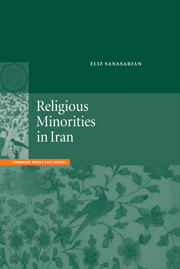Book contents
- Frontmatter
- Contents
- List of illustrations
- List of tables
- Preface
- Acknowledgments
- Notes on transliteration and bibliography
- Glossary
- Introduction: an overview of politics and society
- 1 Ethnic anatomy and politics of non-Muslim minorities
- 2 The Assembly of Experts: debut in the year of destiny
- 3 Policy sphere of recognized religious minorities
- 4 Distinctions and designations as policy output
- 5 Prevalent responses of recognized religious minorities
- Conclusion: the perils of marginality
- Notes
- Bibliography
- Index
- Titles in Series
4 - Distinctions and designations as policy output
Published online by Cambridge University Press: 22 September 2009
- Frontmatter
- Contents
- List of illustrations
- List of tables
- Preface
- Acknowledgments
- Notes on transliteration and bibliography
- Glossary
- Introduction: an overview of politics and society
- 1 Ethnic anatomy and politics of non-Muslim minorities
- 2 The Assembly of Experts: debut in the year of destiny
- 3 Policy sphere of recognized religious minorities
- 4 Distinctions and designations as policy output
- 5 Prevalent responses of recognized religious minorities
- Conclusion: the perils of marginality
- Notes
- Bibliography
- Index
- Titles in Series
Summary
General policy in regard to recognized religious minorities (RRMs) can tell us only so much about the dynamics behind thought and action in a revolutionary regime. The behavior of state actors vis-à-vis the RRMs was characterized by factors that are relevant to other questions and issues. These can be answered only by delving into the larger picture of the meaning of the role of non-Muslim minorities. The widening of the analytical realm allows us to focus on the uniqueness of each group. As a result, it becomes possible to see why the Jews were treated more harshly than were other recognized religious minorities, and why the Bahais and Iranian Christian converts (especially the Protestants) were persecuted. What did each of the these three minorities mean to the revolutionaries and religious extremists (be they clerical or not), and what can such meaning tell us about the underlying components of the policy sphere? The purpose is not to blame, condemn, or sit in judgment but simply to understand the movement of one set of negatives (e.g., stereotyping) into the arena of policy or action.
From a psychological point of view, ethnic conflict has three major components: perception, motivation, and action. The three combine to lead ultimately to full-blown conflict by the final breakdown of relations. Perception of the other is the first stage, involving stereotyping and prejudice that tend to cultivate group hostility.
- Type
- Chapter
- Information
- Religious Minorities in Iran , pp. 106 - 135Publisher: Cambridge University PressPrint publication year: 2000



